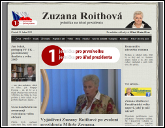Anketa
Podle Vašich zkušeností se uznávání a průběh reklamací ze strany prodejců dlouhodobě:| Zlepšují |
| Zhoršují |
| Nepozoruji žádnou změnu |




Klikněte zde
Informační portál europoslankyně MUDr. Zuzany Roithové na ochranu dětí před nebezpečnými výrobky a službami





od 14.9.2005
Pronásledování křesťanů ve světě
Koptové: "Egyptian Christians return to politics" | |
 |
|
| [ 21. března 2011 | Autor: Ekram Ibrahim ] | |
The revolution and its aftermath have prompted many Copts to get involved in political action, from holding protests to making their voices heard at the ballot box
Since the January 25 revolution, Copts are starting to become politically active. Groups of Egyptian Christians held massive protests after the burning of a church in Atfeeh this month, and the referendum on the constitutional amendments saw huge numbers of Copts voting. But these high levels of participation and mobilization have raised tensions on the ground in Egypt.
The tense debate on whether to vote in favour of the constitutional amendments reached a point where many Muslims and Copts voted serving religious agendas.
In response to this, prominent political and religious figures approached Pope Shenouda III, head of the Coptic Orthodox Church, calling for a common dialogue. Egypt’s Prime Minister, Essam Sharaf, and Deputy Prime Minister, Yehia El-Gamal, visited Pope Shenouda separately yesterday.
In addition to this, the leader of the Muslim Brotherhood group, Mohamed Badie, has for the first time called Pope Shenouda and offered to meet up with Coptic youth in an attempt to explain the Brotherhood’s ideas.
In general, some Copts chose to vote “no” in response to the massive Islamist campaign calling for a “yes” vote.
“Many Muslims voted “yes” to insure the continuation of Islamic rule, while many Copts voted “no” to abolish this,” Diaa Rashwan, Senior Researcher at Ahram Centre for Strategic Studies, told Ahram Online. “If things continue this way during the parliamentary elections, Egypt is really under threat,” he added.
For Kamal Zakher, coordinator of the secular Copts Group, “When Copts saw all this dramatic stress from Islamists on voting “yes”, balanced by political leaders and intellectuals saying “no,” they went for a “no” out of fear of the Islamists’ agenda.”
“Saying that the Copts are the ones who said no is a sectarian idea; in fact, many intellectual Muslims shared the same vote with them.”
Moreover, the way the military responded to the issue of the church burning at Atfeeh this month has intensified the Copts’ fear of an Islamic advance in Egypt.
After the burning of the church, Copts protested and, “the army asked for the help of Salafi religious figure Mohamed Hassan to solve the issue in Soul village, which has increased the Copts’fear,” Zakher told Ahram Online. Hassan met with the villagers and convinced them that their church will be rebuilt. “I want to be granted my rights as a citizen, not after people’s approval,” said Nabil Gobrial, a lawyer.
Egypt has witnessed several periods of sectarian tension in the past couple of years.
Many Copts say that all they want is equal citizenship rights, and they are not focused on Article II of the constitution. Copts - who make up 10 per cent of the Egyptian population- ask "that a paragraph be added to grant them the right to be ruled by Coptic regulations,” Sameh Fawzy, researcher in citizenship issues told Ahram Online.
“We should not expect that the January 25 revolution work like magic to change people overnight; there is still sectarian tension on the ground that needs time and effort to change,” Zakher told Ahram Online.
Meanwhile, it remains unclear whether the political leaders' visits to Pope Shenouda will help to solve the sectarian tension in Egypt or whether awareness should be focused at grassroots level, or whether working with both is the optimum solution.




